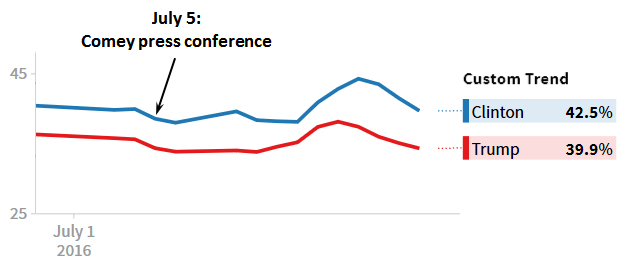On July 5, FBI Director James Comey held a press conference about Hillary Clinton’s email server. By all accounts, his narrative was devastating. She had been “extremely careless.” She had sent and received documents now considered classified. She had used her private server while traveling in unfriendly countries. There was a strong possibility that her server had been hacked.
As it happens, Comey overstated a lot of this stuff. But he did say it. And the reaction of the press was nearly unanimous: Comey had validated many of the worst charges against Clinton. There would be no indictment, but it was certain to hurt Clinton badly. And yet, look what happened according to the Pollster aggregates:

In the week following Comey’s press conference, nothing happened. Clinton’s poll numbers were basically flat, and then bumped up a couple of points. As near as I can tell, Comey’s lengthy rebuke had no effect at all.
This is genuinely puzzling. Sure, the email affair had been going on for a long time and people were pretty tired of it, but Comey made genuine news—all of it bad for Clinton. At the very least, you’d expect a dip in the polls of two or three points for a few weeks.
Why didn’t anyone care? Is this a sign that everyone’s minds are made up, and there’s basically nothing that can change the race at this point? Or does it mean that emailgate was a much smaller deal than we political junkies thought it was?















